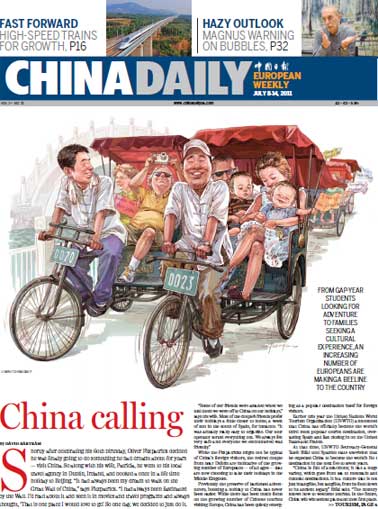Bubble worries
Updated: 2011-07-08 11:02
By Andrew Moody (China Daily European Weekly)
 |
"They went this way and that but the bias was to sustain the commitment to the gold standard. There was therefore excess credit creation and inflation at home and by the time they came to address it in 1928, it was too late."
The Japan case in the 1980s, according to Magnus, has even more direct parallels with China today.
The government wanted to keep the value of the yen low so it would benefit the country's technology exports and pursued a policy of low interest rates, which created an asset bubble that burst.
Magnus says it is alarming that China is talked of today in similar language to Japan three decades ago.
"The balance of financial power then seemed to be changing, Japan was the world's largest creditor, the emperor's gardens in Tokyo were supposed to be worth more than the whole real estate of California and Japan was going to take over the world," he says.
Magnus, who studied economics at Westminster University and then at the School of Oriental and African Studies in London, began his career as an economics writer in the Central Office of Information, part of the UK civil service.
He went on to have high-profile jobs as an economist with Lloyds Bank, Bank of America, SG Warburg and for the past 14 years with UBS, the last six as a "thought leader" for the bank doing research for some of the bank's most high-profile clients.
In this role, he wrote an article in February 2007 saying there were substantive risks of a financial meltdown.
He eventually had discussions with the bank's senior management but they didn't heed his warnings and were one of the European banks worst hit by the financial crisis, having to write off billions of euros of liabilities and make 5,500 employees redundant.
"I do remember having discussions with the management at the time - who are all gone now - more than a year after I had started saying something rotten is brewing. They don't act upon it but by then it was too late," he recalls.
"To be brutally honest, I don't think I had even heard of subprime mortgages in 2006. I had no idea what they were," he says.
Magnus rejects some of the analysis of other writers such as the British Marxist intellectual Martin Jacques, author of When China Rules The World, who predicts a gradual Chinese ascendancy throughout the 21st century.
"There are those that say the West is finished. China will rule the world and we will all become Chinese. I don't think it will be quite like that," he says.
He thinks the United States will continue to be the dominant power for quite some time to come.
"I think it is the only country in the world that can propose global agendas and to try and build a consensus. I don't think the Chinese are in a position to do so and that is partly because they don't want to," he says.
One of the arguments in Uprising is that emerging market economies such as China find it difficult to make the transition to Western standards of living.
"Very few countries have actually done it. The Western countries and regions - and by this I also include the rich Asia Pacific countries and regions of Japan, South Korea, Australia, New Zealand, Hong Kong and Singapore - are the only countries and regions that have actually done it," he says.
He says he is not a Sino skeptic but insists the challenges facing China are often underestimated.
"I don't think it is a big deal that China's GDP will surpass America's in 2025. You only need a modicum of common sense and organizational efficiency to be able to do this with 1.3 billion people compared to 350 million," he says.
"The real issue is per capita income. That is a measure of how prosperous and wealthy an economy really is. I think the gap between China and the United States is going to remain very big for an awfully long time."
E-paper

Shining through
Chinese fireworks overcome cloudy times, pin hopes on burgeoning domestic demand
Pen mightier than the sword
Stroke of luck
Romance by the sea
Specials

90th anniversary of the CPC
The Party has been leading the country and people to prosperity.

My China story
Foreign readers are invited to share your China stories.

Green makeover
Cleanup of Xi'an wasteland pays off for ancient city
